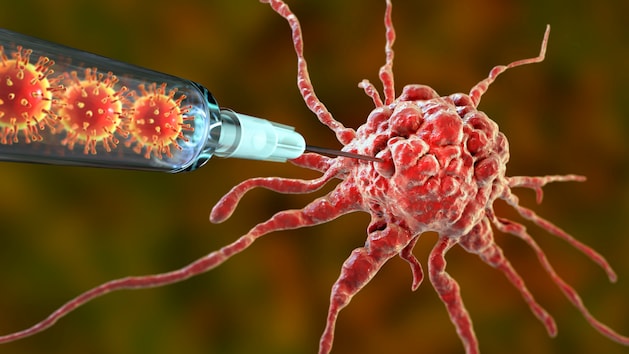Around 300,000 Germans develop shingles every year. Many of them not only suffer from the disease itself, but also from the long-term consequences, some of which are serious. The Heidelberg doctor Martin Hartmann is therefore calling for vaccination.
Last year, Martin Hartmann treated 500 shingles patients at the Heidelberg Dermatology Clinic. Half of them are stationary. Not a single one was vaccinated. The doctor now spoke out in favor of vaccination against the insidious disease in a video on the “Medscape” portal.
The risk of developing shingles continues to increase. Because: Anyone who has ever had chickenpox can later get shingles, i.e. herpes zoster. The disease is a reactivation of chickenpox pathogens, the varicella-zoster viruses. After the chickenpox infection, they have retreated into nerve nodes (ganglia) in the nerves of the spine and the cranial nerves, so they remain latent in the spinal cord.
The bad news is that around one in three people get herpes zoster, with the risk increasing with age for two reasons.
Herpes zoster has two disease stages, an acute and a prodromal stage, i.e. an early stage: In the acute stage, the rash typical of herpes zoster appears. The reactivated viruses reach the surface of the skin along the nerve fibers, red blisters form that itch and burn, fill with fluid, ripen, then burst, crust over and then heal.
Unlike large-scale chickenpox, which spreads over the entire body, the rash is usually limited to a limited region. This is the area of skin (dermatome) that is supplied by the affected nerve fibers. Depending on where the rash occurs, the dermatome can be used to determine which nerve and nerve node is involved.
If the rash appears, it is high time for treatment. The special antiviral medications must then be taken within the first 72 hours, otherwise they will no longer work optimally. Otherwise, there is a risk of complications and secondary illnesses, especially post-herpetic neuralgia. This is sometimes massive pain that can torment the affected skin region and the nerve fibers for months to years.
Therefore, pay attention to symptoms that appear in the early stages, i.e. before the rash, and if in doubt, talk to your doctor about them.
Up to around a week before the blisters appear, the following are possible:
Two to three days before the blisters form:
In addition to the early and acute symptoms, there are also complications with shingles, some of which are very serious. “During the visit, a patient with herpes zoster in the facial area noticed that the right corner of her mouth was hanging down,” says doctor Hartmann. This patient had a complicating facial paralysis, the so-called Ramsey-Hunt syndrome, which occasionally occurs with herpes zoster. And from which pop star Justin Bieber, for example, also fell ill. “This complication is relatively rare,” says Hartmann.
Other complications, however, occur comparatively frequently. According to the doctor, these include:
They were also rarer
“You don’t want to see these complications,” summarizes the expert in the title of his article. In many cases, a vaccination could protect against this. However, none of the patients had this. “They were all unvaccinated. And when I asked why no vaccination had been carried out, it was known that there was a vaccination, but it didn’t fit into everyday life.
The vaccination rate in this country is far too low. Less than 10 percent of Germans have received two vaccinations. “That means the number of herpes zoster cases will not go down.”
The vaccine is very effective and is successful in over 90 percent of cases, even in older age groups. Even after ten years, the value would still be over 80 percent. And: “The vaccination is well tolerated,” says Hartmann in favor of the vaccine.
The Standing Vaccination Commission (STIKO) recommends vaccination
There are different medications for shingles. However, how well they work depends largely on when they are taken. FOCUS Online explains which shingles symptoms you should know and why quick therapy is so important.
Only a few people are aware of the disease shingles, and yet millions of people belong to the risk group for the viral infection, which can cause massive, chronic nerve pain. Vaccination offers protection – to whom Stiko recommends it and when.









